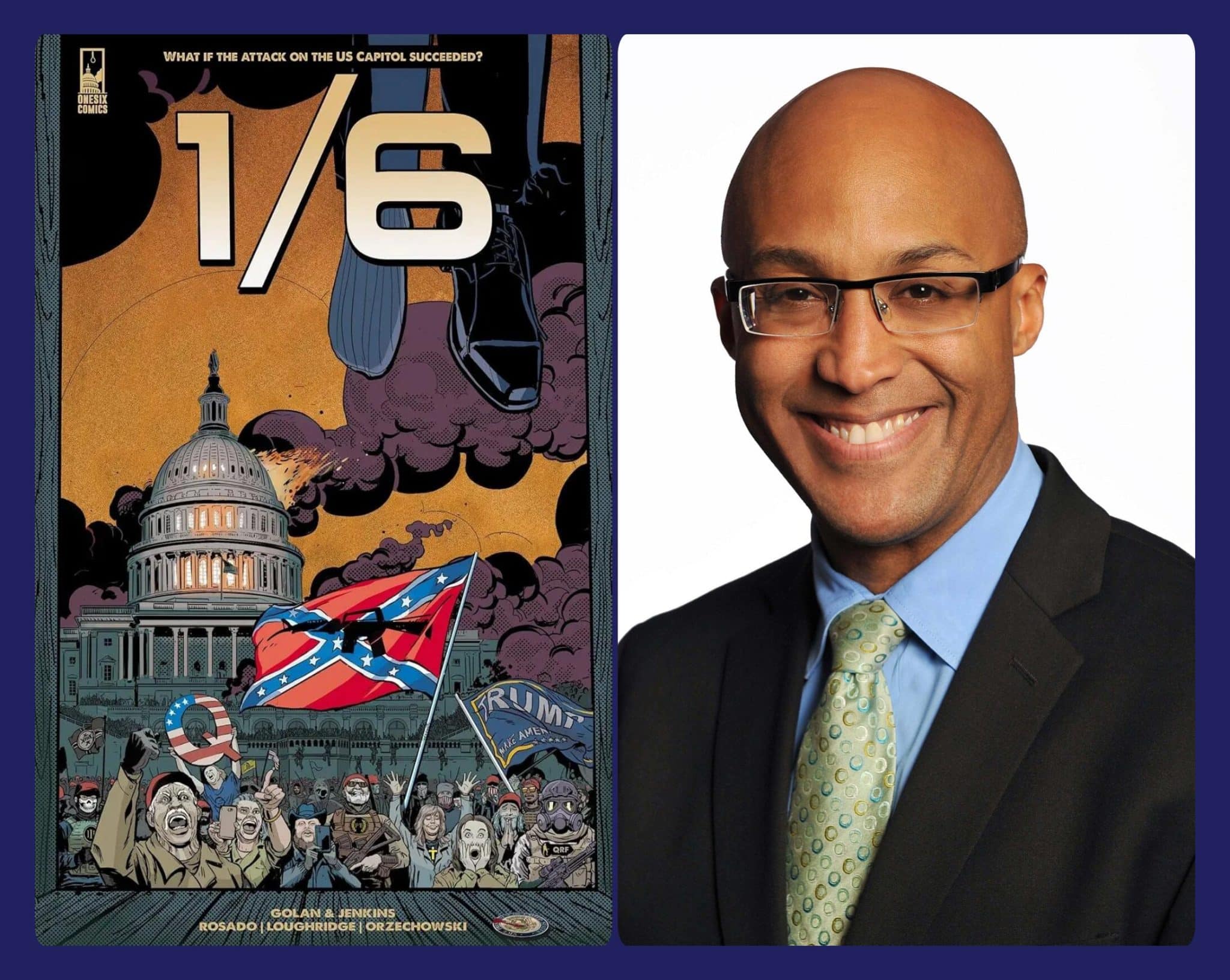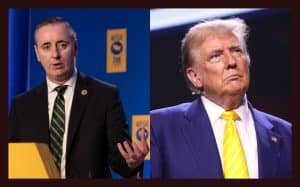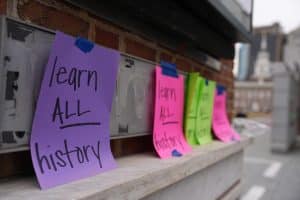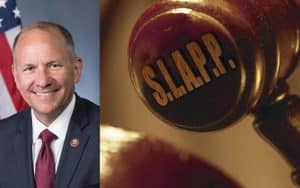Alan Jenkins is a writer, Harvard law professor, and human rights advocate. He and co-author Gan Golan, along with illustrator Will Rosado, led the creation of the graphic novel series 1/6, which asks the question: What if the Jan.6 insurrectionist attack on the US capitol had been successful? In the tradition of speculative fiction from George Orwell’s 1984 to Margaret Atwood’s Handmaid’s Tale, it explores themes of autocracy, scapegoating, strategic disinformation, and more, all of which we are still dealing with as a nation. Alan joins us today to talk about this really informative and critical series, which just released its second issue, and how he and his team are sending copies to schools all across Pennsylvania.
(Also listen on Apple, Spotify, Google and iheart)
So as everyone hopefully knows, on January 6th, 2021, thousands of Trump supporters, which included the Proud Boys, militia members from the Oath Keepers, neo-Nazis, Christian nationalists, or even just suburban moms like Bucks County Republican Dawn Bancroft, they stormed the Capitol to try to, one, stop the certification of the 2020 election, and two, potentially violently attack if not kill non-MAGA members of Congress unwilling to go along with the plot to steal the election for Trump, who had lost by about 6 million votes. Where were you and what were you doing when you first heard and potentially saw as this was live streamed this happening?
Well, you know, just to, I’ll definitely get to your question, but just to jump back for a second, you began with, you know, as everyone hopefully knows, and unfortunately not everyone knows it. And some of the people who, like me, watched it are now being gaslit and told that what they saw with their own eyes didn’t actually happen. And a lot of people are believing that. So that’s one of the reasons why we thought it was important to tell this story. But to answer your question, I was sitting on the couch with my family watching in horror as Confederate flag-wielding rioters ransacked the Capitol, called for the hanging of the Vice President, Mike Pence, chanting for Nancy Pelosi, staffers and others hiding in terror. And then President Trump sitting by and doing nothing for hours and hours. And so that left a mark with me that will never be erased. I’ve focused my career on democracy and the Bill of Rights and the human rights that we all share. And all of those were violated on that day.
When did you decide that you had to do something about that?
Pretty soon after January 6th, 2021, I already saw that the people who were involved in the insurrection were trying to retell the story in a different way that didn’t include them. They were pointing fingers at others. They were denying that an insurrection even happened. And so it seemed to me, you know, we’ve got to find ways to tell this story, not just for history, but for the moment. And so I’m a law professor and I could have written a law review article and it would have been read by tens of people who already agree with me. But it seemed to me more important to reach everyday folks who believe in our democracy, but maybe don’t have the time to read the 800-page House Select Committee report on the insurrection as I have, or not glued to cable news. And so I’m a comic book guy. I always felt that comic books were an important conveyor of good storytelling, but also of some of our shared values. And so I turned to a frequent collaborator of mine, Gan Golan, who is himself a New York Times bestselling graphic novelist. And he said, I’m in. So we were off, but he also said, I don’t have time to do the art myself. He’s a talented artist as well as the co-writer of 1/6. And so we reached out and we’re fortunate to get a bunch of veteran Marvel and DC and Image Comics artists who we’ve been working with.
And what was the process like creating this? Which is now two issues series about what happened that day.
Right. So two issues are out. The third issue is coming out in a few weeks and the fourth issue will be out before January 6th of 2025. We started with a ton of research. So we talked to people who were there, journalists and bystanders. We talked with experts on democracy and authoritarianism and Christian nationalism, which was a significant force, driving force behind the insurrection. People who look at militias and hate groups and others. And then we had to think story, right? Because if it’s not a compelling character driven story, nobody’s gonna wanna read it. We didn’t wanna create a documentary, those exist. We wanted to do something that was in the spirit of comic books, and so fun and dramatic and interesting and often chilling.
And so, Gan and I sat down and we kind of did what you call break story, right? We figured out what are all the beats? What are the things that should happen? And then we had to scale way back because so much had happened in the real world that it was too much to include in a comic book. So we really tried to focus on the highlights because our premise is what if the insurrection had succeeded? It’s speculative fiction. So some of the elements are real, there are things that actually happen, then we visually flag those so readers will know what’s real and what’s fiction. And then a lot of it is speculation about if, if you took the aspirations of many of these actors, not only former president Trump, but Proud Boys and the Oath Keepers and others, what might our society look like months and years after a successful insurrection? And then we got to work. We created a script and we handed it to our artists and they came back with just amazing images.
So like you said, your graphic novel series is in the same tradition of speculative fiction, such as like 1984, The Handmaid’s Tale, both of which, not surprisingly, are now being targeted by MAGA book banners across the country. You had said that your this series asks and answers the questions like what if January 6 had been successful and what would this post -democracy authoritarian America look like? Did you turn to history and like past authoritarian regimes or dictatorships to help create the world you made for 1 -6, the graphic novel?
Very much. You know, we looked at our own country’s history. And so particularly in issue three, you’ll see some images that are straight out of the kind of repressive reaction to the civil rights movement in the 1950s and 60s in the South. McCarthyism also in the 1950s. We also looked at other nations. So on the one hand, former president Trump has said that he would do mass executions and execute drug dealers. These are things that he said in speeches. We looked at, you know, how has that played out? What’s happened in the Philippines under a repressive regime, in Iran, in China, after Tiananmen Square? We’ve seen this play out. We’ve seen that it’s political opponents who are targeted. We’ve seen that they paint with a broad brush because the intention is terror and repression, not justice. And so we have drawn very much from what’s happened in other societies, as well as our own.
So speculate first what you see happening after this election. As listeners pay attention to the news, President Trump is already laying the groundwork to contest the election, suggesting the only way it’s fair is if he wins. And then you have to turn to what his supporters are saying too, which I think is just as important, if not more so. Someone who comes to mind is Kevin Roberts, the Heritage Foundation president and one of the architects behind Project 2025, maybe which could have been useful as you were writing this, because it is a playbook to kind of create an authoritarian United States. But what he said is like the second American revolution is coming and it will remain bloodless if the left, you could say is anyone that opposes MAGA or Trump stealing the election, if they allow it to be.
Yeah. So a few things, Cyril. One is, you know, 1/6 is a nonpartisan work. We started it long before we knew who was going to be running for president. We will continue it after the election. And as the story depicts on January 6th and around January 6th, 2021, there were heroes who were Republicans. There were heroes who were Democrats. There were heroes who were independents, people who stood up, many people with whom I disagree bitterly on lots of issues, but I agree on the importance of upholding our democracy and our democratic principles. And so the story is about what if January 6th, the January 6th insurrection had been successful, not about, you know, this election. But I do want to address some of the things that you raised, because whoever wins the election in November the threats to our democracy are going to be with us and they might even grow. So the Christian nationalism, the anti-Semitism, the bigotry, the disinformation, which is on the rise, intentional disinformation, the authoritarian instincts, as you note, Project 2025 is just one indicator of the ways in which that our democratic values and institutions can be stripped away to create a more authoritarian and less democratic nation and less equal nation. And we see lots of things at the state level, which have nothing to do with who becomes president.
So as you noted, book bannings are on the rise. Pennsylvania is one of the top five states in the country for the banning of books. So Pennsylvania is the birthplace of our democracy. It’s also the first state to begin to end slavery. It’s been a very important place for our civil and human rights. And yet it is also a place at which some authoritarian practices like the banning of books is on the rise. It’s also a place where, as is depicted in issue two of our comic book, fake electors were sent to try to supplant the election victory of Joe Biden.
There is significant denial, election denialism. So we need to be on the lookout for authoritarianism and work against it. Whoever wins, it’s crucial to vote, and to vote democracy in this election. Yesterday was National Voter Registration Day. I hope everybody, you know, all of your listeners went out and got registered and are going to vote. There’s a lot more that we have to do, you know, whoever wins a given election.
And Pennsylvania is also a key state for the Christian nationalist movement, as well as the big presence of the New Apostolic Reformation, which kind of seeks to conquer the, quote unquote, seven mountains of society. And going back to, as well as not to mention Doug Mastriano, who was a gubernatorial candidate and essentially a very outspoken Christian nationalist himself. But going back to the fake electors, I just want to point out to listeners like here in Bucks County, the head of the Bucks County GOP, Pat Poprick, was one of the fake electors for Trump in Pennsylvania, which unfortunately the local media, the corporate media, the Gannett -owned Bucks County Courier Times and Intelligencer, four years later have still refused to report on. And to make matters worse, she was named as a Trump elector again and gave an interview with the media outlet Votebeat and said she would challenge the election again if she saw similar quote unquote issues, which are non -existent issues, to the outcome of this forthcoming election, as well as the fact that one of the other electors named for Trump’s slate of electors for Pennsylvania is a man named Jim Worthington who is a MAGA millionaire. He’s very close with the president. His former organization, People for Trump, and let me just say he’s denied he’s had anything to do with this, but his organization did. They actually bussed hundreds of people to Washington, DC on January 6th, though he maintains that you know, they had no intention of participating in what happened when the Capitol was stormed, even though the flyers that got scrubbed off the internet said that they would march to the Capitol after the initial rally where Trump gave his speech. So I think Pennsylvania listeners right now in addition to listeners across the country definitely will kind of be able to read this graphic novel series and just kind of really relate to it through their own experiences.
Yeah, I hope so. And if I can just tell you a quick story at Baltimore Comic Con. So I’ve been to a bunch of Comic Cons in the last two years. If anybody who knows me knows, I don’t need an excuse to go to a comic book convention. But at one of them where I had the book with me, a gentleman came up to me and he said, I love this, you know, series. It looks so cool. Where’d you get the idea? Were you there? And, you know, and I said, well, you know, I wasn’t there, but
I’ve spoken to a lot of people who said, I was there. I said, really? What were you doing there? He said, well, President Trump told us to go. And so I went and I saw him speak on the ellipse and then he told us to go to the Capitol. And so I marched on the Capitol and then people started breaking into the Capitol and I was going to break into the Capitol. And at this point, Cyril, he took out his phone and started showing me photos of himself at the Capitol on January 6th with mayhem in the background. And he kept saying to me, you know, I don’t usually tell people this. And I’m thinking, we just met? But he continued. He said he was getting ready to break in. And a woman who came on the bus with him down from his town said, you know what, I’ve got a kid at home. You’ve got kids at home. I don’t think we should go in there. I think we’re going to get in trouble. And he said, the fever broke in terms of breaking into the Capitol. He says he didn’t go in, but that lots of people he was with did and were subsequently prosecuted. He said he was looking over his shoulder for a year, expecting the FBI to break down his door. He told me he came in to the insurrection through, he said he went down the QAnon rabbit hole. That’s how he described it to me.
But you know, at no point Cyril did he say to me, I now realize everything I did was wrong and fueled by a lie, but he was clearly somebody who was trying to figure out, did I do the right thing? Was I lied to? Was it worth it? And you know, to me, that’s why we did a comic book, because there’s no other circumstance in which I would have a 20 minute conversation with an insurrectionist about the insurrection, about QAnon, about
Trump and the media. And it was civilized and, we’re both dads and we talked about that and we love comics and we talked about that. And, for me, that’s my favorite story. I don’t know if I convinced him, but I convinced him of my humanity and he convinced me of his. And it was a reminder that there were a lot of bad people involved in January 6th from the right wing militias to cynical politicians who knew better.
And there were a bunch of everyday people who listened to the wrong folks and were misled, intentionally misled by political rhetoric and the media and calls to violence. And we need to remember their humanity and to reach out to people who maybe, you know, supported this because they thought it was the right thing, but are reachable in terms of the truth.
Yeah, I agree. I definitely think there are some people that just kind of maybe were at the initial rally to listen to President Trump, but got swept up by this kind of mob mentality or by the just the forces of a crowd. Although I do feel like some of the actors in this, like maybe some of the Proud Boys or someone like Stuart Rhodes were kind of like the conductors kind of orchestrating the crowd, or being like pied pipers, leading them into this kind of violent frenzy with Trump being the main one. Do you think that the American public has become desensitized to this authoritarian know, drift if not current that we find ourselves in.
Well, you know, I think it varies. One of things I teach my students is that, you know, for strategic communications purposes, there’s no general public, right? There’s, you know, people affiliate and identify in lots of different overlapping ways. I think the majority of Americans say that they are very concerned about our democracy for different reasons. And, you know, they, for a while they ranked that as one of their top, you know, one or two concerns and that’s dropped over time.
So I think the concern is waning in some quarters. I think some folks are very energized around it. And you see people taking action, organizing on social media. But for others, there’s a lot going on in their lives and they’re paying less attention, which is why I think it’s important for us to tell the story again and again of our democracy at risk and what we can do about it. Because I think giving people new problems without a solution can be demobilizing rather than mobilizing it. So we need to be clear that there are things people can do in their communities, especially, you know, in an election year. But even outside of the election, they can be working, you know, to support their librarians. They can be supporting or even serving as election workers or election watchers.
They can be on the lookout for bigotry in their schools and white supremacy and organize against that. For that reason, we worked with an organization called Western State Center and created a free education and action guide, which is available at www.onesixcomics.org, but also there’s a QR code inside the comic book that you can scan. And it gives people of all ages bunch of things that they can do to uphold democracy and fight bigotry in their communities and in their state.
Great. Yeah, I mean, I only asked because I was thinking of the last debate and Trump made that racist comment about Haitian immigrants stealing and eating cats and dogs. And if you looked online, I think the knee-jerk reaction was to make fun of it. And you saw a bunch of memes. But this was actually a really racist thing for him to do. And I also feel like it was like a tool from the fascist tool chest to kind of incite violence, which in fact it did as we’re seeing play out in Springfield, Ohio, right now with the bomb threats to different government buildings, to even schools. And now Haitian families are living in a state of terror. They’re pulling their children from school. And so maybe like kind of trying to make light of that is just a defensive reaction in some sense. But yeah, like you said, like there is no general public, right?
Yeah. And, and to your point, Cyril, I think, you know, two things about that racist statement that Trump made. One is, you know, it is out of the authoritarian playbook to attack the most vulnerable people through lies and to dehumanize them, right? To make them seem completely unlike, you know, quote, the rest of us. Second thing is, you know, Trump is a genius of media and you know, Trump and genius don’t always go together except in his mind, but he knows exactly what he’s doing because what are you and I talking about right now? We’re talking about immigration, which is what he wants us to talk about. And we’re talking about Trump, which is the other thing he always wants us to talk about. So coming off a terrible debate performance, rather than talking primarily about that or the people in the political sphere talking about that, or talking about some of the pressing issues, including our threats to democracy, we’re talking about this, you know, initially this nonsense, but now as you note, it’s, it’s very dangerous, lies and falsehoods. So I’m trying never to repeat the falsehood that he stated and, you know, but we do have to address the harm that he’s done. There’s no question.
So since I brought up the debate, I believe that same day, you and your team launched a campaign to put copies of 1/6, your graphic novel, the first two issues in the hands of young people across Pennsylvania. And you’ve sent thousands of copies of the graphic novel to public high schools and libraries from Philadelphia to Pittsburgh. Can you talk to us a little bit about why you decided to do this and how this program or initiative is going?
Yes, and the copy should be arriving at public schools in Bucks County as we record this podcast. So that’s happening now. You know, as I said, democracy is one of our most important values. It’s the, in my view, the most important thing we share as Americans. It’s the way we have a say in decisions that affect us. It’s a way that we uphold all the other rights and responsibilities that we have as members of this country and this society. And it’s absolutely crucial that especially, high school students who are exploring ideas and trying to understand how the world works and where they fit in it and what their civic responsibilities ought to be, that this story is part of their development and their decision making. It’s one perspective and one story where this is a story of what we believe could have probably would have happened if the insurrection had been successful, as well as in issue two, the things that happened that led up to the insurrection itself. And as I noted, we’re very clear about what are documented facts in that issue versus speculation. We want that to be in the public discourse. And we want to make it as easy as possible for that to be in front of teachers, educators, librarians, and ultimately, students. We’ve sent the issues to hundreds and hundreds of schools and libraries in Pennsylvania and we’re looking forward to hearing what people do with them.
Did you contact the schools beforehand or did you just kind of like do the you know research about the addresses in the libraries, or the librarians, etc.?
It’s the latter. So we’re sending them first to typically to the superintendent of schools and to the school librarian. And, you know, so then, as I said, they’ll be receiving those this week as we’re recording.
I’m interested to learn about how they are received. Going back to Pennsylvania and Pennridge School District, the previous school board which had a super majority Republican kind of Moms for Liberty members or affiliated board, they were recently voted out of office, but previously, they had banned any talk of January 6th with teachers in the school district. I know for a fact there’s school boards across the Commonwealth that have that, unfortunately have that kind of mentality right now still. We’ll have to talk again after you get some feedback because I’d love to learn about some of the reactions, hopefully more positive than negative. Because in the end, your graphic novel series is a catalyst for discussion about what happened that day. And where this is used in the classrooms, the teachers can kind of facilitate that to help these students kind of formulate their own thoughts about what they probably had witnessed, read about, heard about, talked about in the past. But another thing that I really love about this project is that it’s education for action. Because as we know, democracy is a verb, or it should be, right? And it needs to be a verb in the active voice that we are all using and practicing. And so, you know, in addition to this, you know, great, really entertaining and informative series of graphic novels, like you said, you partnered with the Western States Center and I hope people, and I’ll drop a link in the show notes, go to that as well so that, you know, just, you know, educating yourself is only just the first step, then you actually have to kind of, you know, do something about it to kind of strengthen the democracy that we are still living in for the time being right now, because, you know, as history has proved, democracy is very fragile, and we were just just a breath away from seeing that slip through our fingers.
I love what you said about democracy as a verb. You know, we want everyone to be doing democracy all the time. And, you know, that is, there’s no party affiliated with that. There’s no, you know, ideology. It’s just, it’s something that we, we all should share about democratic participation. And, you know, for that reason in the schools that are receiving, all the schools that are receiving the comic book, that the idea is not, you should agree with the authors or with this take. Let’s discuss it. Let’s talk about it. Ultimately, that’s what democracy is about. you know, facilitate it, as you said, by teachers and librarians. We don’t, we’re not going to shout about it. Let’s have a civilized discourse like I had with my friend, the insurrectionist at the Baltimore Comic Con in which we talked about our shared values as well as the places where we disagree. That’s how we’re going to survive and thrive as a democracy, not through censorship, which is one of the most undemocratic things that we can do.
Well, Alan, thank you so much for your time. I want to thank you and your team for, you know, creating this amazing project. I read the first one last night and I’m halfway through the second one and I’m looking forward to issue three. And hopefully the listeners, please order this through your local bookstore. I know it’s available on Amazon. I’ve been reading it through Kindle as well because right now I’m not in the country, so I can’t get a physical copy. But thanks again for your time and thanks for this amazing project.
Yeah, thank you so much Cyril and yeah, Amazon and also onesixcomicstore.com, and again, that education and action guide, totally free and I hope folks will download it and use it in their community. Thanks so much for having me.
Thank you.
Visit: https://onesixcomicsstore.com/ and https://www.westernstatescenter.org/onesixcomics






